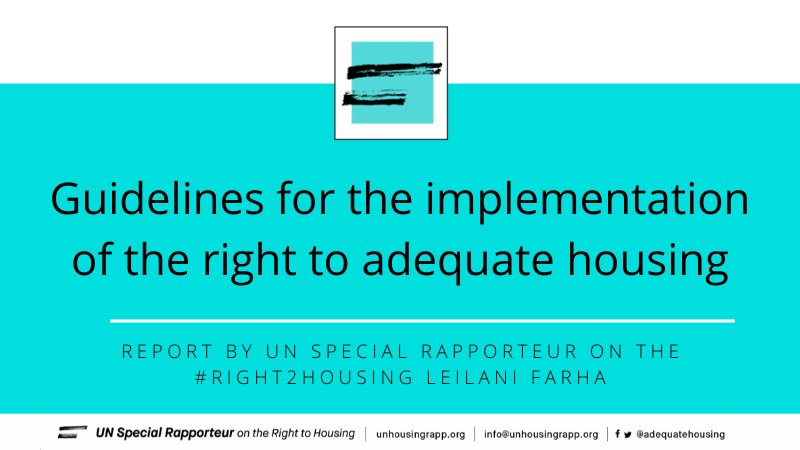
Source: Special Rapporteur on Adequate Housing
The Special Rapporteur on adequate housing, Leilani Farha, submits her final report with Guidelines for the Implementation of the Right to Adequate Housing. The document seeks to respond to global housing conditions focusing on the key requirements of effective rights-based responses to emerging challenges. It has been drafted based on her experiences during her mandate and through consultation with States and other stakeholders throughout the length of the mandate, as well as a special consultation process in which the Global Plattform for the Right to the City has taken part.
The current global crisis in housing is unlike any previous crisis. It is linked to growing socioeconomic inequality, large-scale financialization of housing and land and unsustainable housing systems that treat housing as a commodity. In the Special Rapporteur’s experience, States are not always aware of how human rights obligations apply in the context of housing and, more importantly, of how those obligations can be translated into concrete actions to address the crisis.
The Guidelines provide States with a set of implementation measures in key areas of concern, including homelessness and the unaffordability of housing, migration, evictions, climate change, the upgrading of informal settlements, inequality and the regulation of businesses. All of the implementation measures are informed by the urgent need to reclaim housing as a fundamental human right. Implementation of the Guidelines will substantially alter how States treat housing, creating a new landscape where housing can be secured as a human right for all.
The Guidelines build on the normative standards that have emerged from the existing jurisprudence within the international human rights system, as well as from the recommendations and experiences of the Special Rapporteur. They do not attempt to cover all State obligations related to the right to housing. Rather, they describe the key elements needed for the effective implementation of the right to housing as it has been elaborated under international human rights law.
The guidelines cover the following topics:
- Guideline No. 1. Guarantee the right to housing as a fundamental human right linked to dignity and the right to life
- Guideline No. 2. Take immediate steps to ensure the progressive realization of the right to adequate housing in compliance with the standard of reasonableness
- Guideline No. 3. Ensure meaningful participation in the design, implementation and monitoring of housing policies and decisions
- Guideline No. 4. Implement comprehensive strategies for the realization of the right to housing
- Guideline No. 5. Eliminate homelessness in the shortest possible time and stop the criminalization of persons living in homelessness
- Guideline No. 6. Prohibit forced evictions and prevent evictions whenever possible
- Guideline No. 7. Upgrade informal settlements incorporating a human rights-based approach
- Guideline No. 8. Address discrimination and ensure equality
- Guideline No. 9. Ensure gender equality in housing and land
- Guideline No. 10. Ensure the right to adequate housing for migrants and internally displaced persons
- Guideline No. 11. Ensure the capacity and accountability of local and regional governments for the realization of the right to adequate housing
- Guideline No. 12. Ensure the regulation of businesses in a manner consistent with State obligations and address the financialization of housing
- Guideline No. 13. Ensure that the right to housing informs and is responsive to climate change and address the effects of the climate crisis on the right to housing
- Guideline No. 14. Engage in international cooperation to ensure the realization of the right to adequate housing
- Guideline No. 15. Ensure effective monitoring and accountability mechanisms
- Guideline No. 16. Ensure access to justice for all aspects of the right to housing
You can access the full text here.




